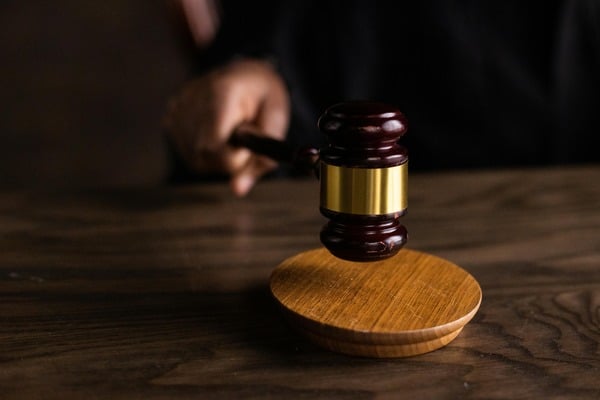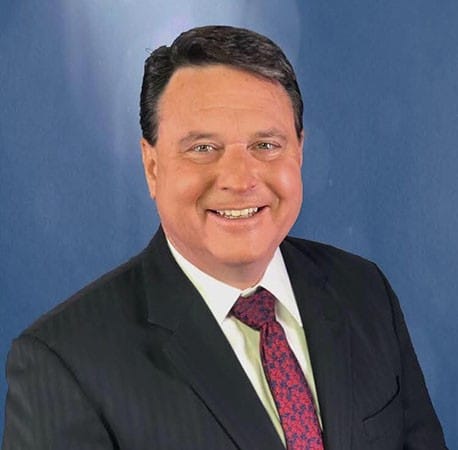
By Marilyn Odendahl
The Indiana Citizen
September 10, 2025
The parties in the disciplinary case against Indiana Attorney General Todd Rokita have selected Indianapolis attorney James Riley Jr. as a mediator to see if a settlement can be reached before the December hearing.
Rokita is facing a second round of disciplinary charges based on accusations he violated the attorney code of professional conduct by not being honest with the Indiana Supreme Court in his previous disciplinary case, which ended with a public reprimand. The state’s top lawyer has denied the allegations and tried to get the second matter dismissed, but the Supreme Court ordered the case to proceed and encouraged Rokita and the Indiana Supreme Court Disciplinary Commission to see if they could resolve the issues through mediation.
Riley was one of three potential mediators the hearing panel recommended in a pre-hearing scheduling order. The other mediators suggested were retired Indiana Supreme Court Justice Steven David and Patricia Polis McCrory, a litigator and business adviser at Harrison Moberly and the owner and sole member of the Mediation Roundtable, LLC. In their joint notice, the parties did not explain their choice.
Of counsel at Riley Bennett Egloff in Indianapolis, Riley is an experienced litigator and mediator. He is a member of the American Arbitration Association’s panel of commercial arbitrators, where he has participated in extensive training and handled a variety of cases. Also, he has served as a mediator in commercial and business cases and was chair of the Indiana Department of Insurance Medical Review Panel in more than 150 medical malpractice cases.
Filings in the disciplinary case do not indicate when the parties will enter mediation, but the panel set a deadline of 45 days from its Aug. 22 order.
If the parties do not reach a settlement, then the case will proceed to a hearing. The panel scheduled a hearing to start at 9 a.m. Dec. 18 at the Marion County Superior Court.
Potentially complicating the case is a motion to intervene filed by a suspended Indiana attorney, who is contesting the order for a three-member panel to preside over Rokita’s disciplinary matter. Typically, only a single officer will conduct a disciplinary hearing, but the Supreme Court granted Rokita’s request for a three-member panel to counter what he claims is a political motivation fueling the charges.
Doug Bernacchi, of South Bend, who had his law license suspended for one year without automatic reinstatement in November 2017, is arguing the appointment of the three hearing officers violates an admission and discipline rule, and raises constitutional concerns related to equal protection and due process. Asserting that only one person presided over his own disciplinary hearing even though he says his case was marred by political bias, Bernacchi is asking the Supreme Court to stay or reconsider its order creating the panel.
“Justice requires that Attorney Rokita should not be afforded more protections than were offered/provided to former Attorney Bernacchi,” the motion to intervene argued.
Included in a series of rulings issued Aug. 22, the hearing panel denied Rokita’s motion to compel discovery, potentially limiting the attorney general’s defense against the current disciplinary charges he is facing.

The attorney general had sought to force the disciplinary commission to turn over materials and documents that he said were relevant to the motivation for pursuing the current complaint filed against him and to his anti-SLAPP defense. Rokita moved to compel the discovery of the commission’s communications about him, the investigations into his actions and information related to the allegations in the disciplinary complaint.
Previously, Rokita had raised similar arguments before the Indiana Supreme Court in his motion to dismiss the second disciplinary complaint. The Supreme Court denied the motion, ruling the arguments Rokita made would be better addressed through the disciplinary hearing process.
In its order, the hearing panel kept focused on the matter as presented in the disciplinary complaint.
Rokita is facing charges related to the statement he made at the conclusion of his first disciplinary case in November 2023. He was publicly reprimanded for his comments about Dr. Caitlin Bernard, an Indianapolis OB/GYN, who became the target of an investigation by his office after she confirmed she had performed a legal abortion on a 10-year-old rape victim from Ohio.
Following the Indiana Supreme Court’s reprimand, Rokita issued a public statement, saying that he had “evidence and explanation” for everything he said about Bernard and that he could have continued to fight the disciplinary charges. However, he said he chose to accept the negotiated settlement to save the taxpayers money.
The second disciplinary complaint alleges Rokita was not truthful during the resolution of his first disciplinary case. Namely, the complaint accuses the attorney general of making false statements to the Indiana Supreme Court in his previous disciplinary proceeding, engaging in dishonest behavior by misrepresenting that he had accepted responsibility for his prior misconduct, and contradicting the prior admissions he had made in the sworn affidavit, which he signed as part of the settlement.
“In our view,” the panel wrote in its order, “our task, as framed by the Supreme Court’s opinion denying (Rokita’s) motion to dismiss, is to determine whether (the attorney general) intentionally misled the Supreme Court (in his first disciplinary case), thereby violating his duty of candor, and nothing more.”
The panel did address Rokita’s anti-SLAPP argument. Indiana’s anti-SLAPP statute provides a defense against Strategic Lawsuits Against Public Participation which are meant to quell an individual’s constitutional right to petition and free speech. Rokita has claimed the disciplinary commission is infringing on his right to speak to the public as an elected official.
However, the panel noted the anti-SLAPP statute provides a defense in a civil action and the attorney disciplinary proceedings are a kind of litigation that is neither civil nor criminal. Also, in the only case that could be found where an anti-SLAPP defense was raised in a disciplinary action, the Rhode Island Supreme Court rejected it, noting the defense was wholly inapplicable to attorney disciplinary proceedings.
“We cannot see how any internal communication, investigation, or other information gathered by the Commission could shed any light on (Rokita’s) state of mind when he indicated to the Supreme Court that he had taken responsibility for his actions (in his first disciplinary case), which, again, is the only question before us,” the panel wrote in its August order. “Indeed (Rokita) does not claim that they do, claiming only that the requested materials are relevant to his Anti-SLAPP defense…. As we have already determined, an Anti-SLAPP defense is not available to (Rokita) in this proceeding.”
Bernacchi spends much of his motion to intervene refuting the charges in his disciplinary case and criticizing the attorney disciplinary process. He claimed his case was “full of procedural irregularities,” while he alluded that Rokita is using taxpayer money to pay for his defense and “is getting more accommodations.”
“As a former attorney and now a mere member of the public, (Bernacchi) has a direct interest in ensuring the disciplinary process operates fairly, consistently (not selectively), and constitutionally, particularly for sole practitioners who face disproportionate scrutiny compared to high-profile respondents like the Attorney General,” Bernacchi’s motion said.
The Indiana Supreme Court in a per curiam order issued in October 2017 found Bernacchi had committed attorney misconduct and that his actions during the disciplinary process were “deeply troubling.” According to the order, Bernacchi incompetently represented a client, charged an unreasonable fee, improperly split his fee with a nonlawyer assistant, and attempted to obstruct the disciplinary process.
The grievance that eventually led to Bernacchi’s suspension was filed by a woman who had hired him to represent her in a child support dispute. The woman, according to the Supreme Court’s order, was the guardian of her grandson and was trying to get financial assistance from the child’s parents, one of whom was her adult son.
Bernacchi filed appearance on behalf of both the woman and her son, even though they were adverse parties, and he told the trial court in one hearing that he was representing the son and in the next hearing that he was representing the woman, the Supreme Court’s order said. Also, the woman did not appear at any of the hearings and Bernacchi gave “inconsistent explanations” for why she was not there.
Moreover, Bernacchi told the trial court the son was terminally ill and should not be obligated to pay support, the Supreme Court’s order said. When the woman told Bernacchi to correct his statement to the trial court, he refused. Also, the attorney did not refund the woman’s money until two years later.
During the disciplinary process, Bernacchi repeatedly asked the client to withdraw her grievance in exchange for a refund of the fees she had paid him, the Supreme Court’s order said. In addition, according to the court’s order, Bernacchi had contacted multiple members of the disciplinary commission, trying to get the investigation dismissed.
Bernacchi told the disciplinary hearing panel he wants to “address systemic and glaring deficiencies in the Indiana attorney disciplinary process” by intervening in Rokita’s case.
“The Court’s recent Order in this matter, appointing multiple hearing officers not afforded to (Bernacchi) or other sole practitioners, perpetuates a system of selective enforcement that disproportionately favors high-profile respondents, such as elected officials, over sole practitioners like (Bernacchi) that erodes respect for the profession and undermines public confidence in the judiciary,” Bernacchi’s motion said.
The panel in Rokita’s case has not issued a ruling on Bernacchi’s motion to intervene. The panel has scheduled two pre-hearings for Sept. 30 and Nov. 19 and set a Dec. 4 deadline for final witness and exhibit lists as well as pre-hearing briefs.
Dwight Adams, an editor and writer based in Indianapolis, edited this article. He is a former content editor, copy editor and digital producer at The Indianapolis Star and IndyStar.com, and worked as a planner for other newspapers, including the Louisville Courier Journal.
The Indiana Citizen is a nonpartisan, nonprofit platform dedicated to increasing the number of informed and engaged Hoosier citizens. We are operated by the Indiana Citizen Education Foundation, Inc., a 501(c)(3) public charity. For questions about the story, contact Marilyn Odendahl at marilyn.odendahl@indianacitizen.org.